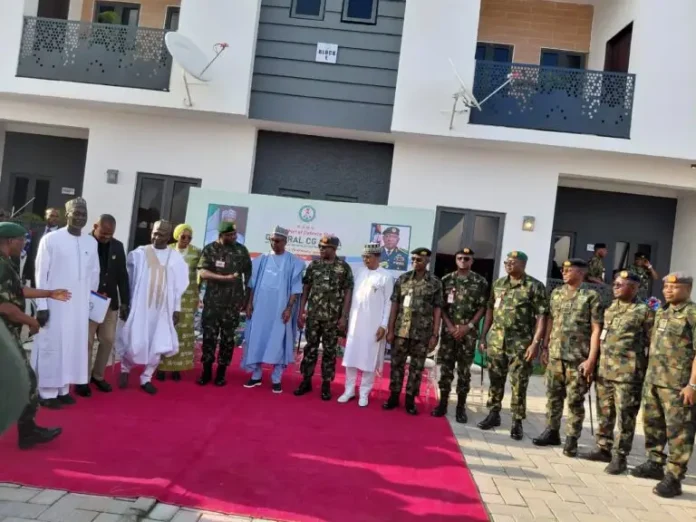News Investigators/ The Speaker House of Representative, Tajudeen Abbas says addressing Nigeria’s security challenges requires a combination of military action, political will and justice.
Mr Abbas said this on Friday while inaugurating officers’ accommodation at Niger Barracks extension and Link Road in Mambilla Barracks, Abuja.
He noted that Nigeria had in recent years faced complex threats such as terrorism, insurgency, banditry, kidnapping, oil theft, piracy, cyber threats, and transnational organised crime.
Mr Abbas said that these challenges evolve rapidly, testing the nation’s institutions and stretching her resources.
“Yet, Nigeria’s story is not merely about threats, it is also about resilience, adaptation, and reform
“Looking ahead, Nigeria’s security requires cooperation between government and society. Military action alone cannot solve every challenge.
“It must be complemented by political negotiations, community participation, economic empowerment, and justice,” he said.
The speaker said that the national assembly had supported appropriations for critical platforms, ammunitions, communications systems, intelligence, surveillance and reconnaissance capabilities.
He also said that the assembly had supported appropriations for force protection assets, while ensuring accountability, value for money, and timely delivery.
According to him, we have approved funding for barracks rehabilitation, family housing, healthcare, mental health support, and post-service transition programs.
He added that the House through effective oversight, had promoted better inter-agency collaboration, clarified procurement processes, and drawn lessons from past experiences.
“In addition, we are advancing legislative proposals to deepen professionalism and accountability within the security sector.
“These include strengthening the legal framework for joint operations, improving the welfare and pension systems for serving personnel and veterans, supporting local defence industries under the Made-in-Nigeria initiative, and developing more agile logistics and maintenance structures.
“This aims to build a military that is well-led, well-equipped, properly supported, and transparently governed; a military worthy of the great nation it serves.
“We must therefore share intelligence, deploy technology responsibly, and ensure our troops have the resources they need to succeed,” he added.
Mr Abbas assured that the National Assembly stood ready to continue working with the executive, armed forces, traditional institutions, and international partners to achieve shared objectives of peace and stability.
Earlier, the Chief of Defence Staff (CDS), Christopher Musa, said the link road and newly constructed buildings were designed not just for convenience, but as essential infrastructure that supported efficiency, safety and comfort of officers.
Gen. Musa reiterated that the Niger Barracks extension block, which would accommodate policy makers in the Defence Headquarters, provided a conducive atmosphere where they could have the peace of mind to articulate valuable and forward-thinking policies.
According to him, these policies will continue to ensure that the armed forces of Nigeria remain effective, professional and successful in all operations.
He said the project was in alignment with his leadership philosophy, which is “To Nurture a Professional Armed Forces of Nigeria that is People-Centric, Collaborative and Capable of Meeting its Constitutional Responsibilities in a Joint Environment”.
“In particular, the second pillar of this philosophy emphasises ‘Prioritising Troops’ Welfare’.
“Consequently, the provision of these quality facilities reflects our deep understanding that operational success begins with the welfare and morale of our people.
“By improving their quality of life, we are investing directly in the strength, efficiency and unity of our forces,” he said.
The CDS acknowledged the support of the national assembly through timely budgetary approvals.
He noted that President Bola Tinubu administration’s commitment to the welfare, training and operational needs of troops had been remarkable.
“It is this support that continues to boost morale and motivation, leading to the visible reduction of insecurity across the nation,” he added.
NAN


